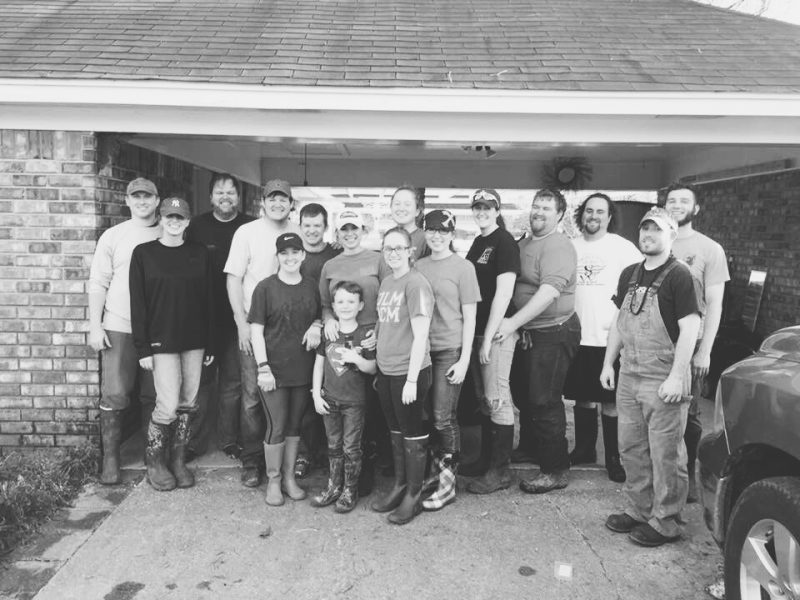 Below is a post I’d started regarding how to handle death/tragedy as an outsider, as a friend or acquaintance of the effected, or as a mere stranger who wants to help. Since sharing my post after the Baton Rouge flooding, I’ve been asked to come up with a list of things others can do to help. I left the original message intact and added this first portion of items that YOU can do to help in a flood or similar tragedy. Browse the list. See what you’re capable of doing. And offer a helping hand. Believe me, there’s no task too small and your good deeds will mean the world to those hurting. After browsing this list, continue to read my original thoughts below. These were written a few months after navigating our own tragedy and offer some insight on what to do AND what not to do.
Below is a post I’d started regarding how to handle death/tragedy as an outsider, as a friend or acquaintance of the effected, or as a mere stranger who wants to help. Since sharing my post after the Baton Rouge flooding, I’ve been asked to come up with a list of things others can do to help. I left the original message intact and added this first portion of items that YOU can do to help in a flood or similar tragedy. Browse the list. See what you’re capable of doing. And offer a helping hand. Believe me, there’s no task too small and your good deeds will mean the world to those hurting. After browsing this list, continue to read my original thoughts below. These were written a few months after navigating our own tragedy and offer some insight on what to do AND what not to do.
How to help:
- Gather tubs/boxes for them to pack in. If there’s items that can be saved, they’ll need something to pack them in. These aren’t usually items that come around on the donation trucks, so pulling together something to pack in could be very helpful.
- Help pack salvageable items. They need to save everything they can. Help them with this process, just be sure NOT to put anything wet into a box.
- Write down damaged items for them. As someone is cleaning out the damaged items, someone needs to make an inventory of what’s tossed for insurance purposes.
- Help with demo. The most obvious way to help is to help with the demolition. Wet furniture and belongings need to be removed. Carpets need to be pulled and sheetrock/baseboards need to be removed. Anything and everything that was touched by water needs to be removed for the house to dry properly. This job can be done by most, not just the strong ones. Carrying out pieces of sheetrock and baseboards isn’t as labor intensive as you might initially think.
- Wash clothing. Some of the wet clothing might be salvageable and even the dry items need to be laundered before packing away or wearing again. This job is great for someone who has to remain at home and isn’t able to do manual labor.
- Run errands. Most likely the effected need medications or toiletries picked up. They may need something taken to the post office, etc. Offer to run these errands for them because they likely need to be at the home or on the phone for now.
- Deliver food. During a major tragedy, there will probably be organizations delivering meals. If not, be sure they have something to eat, especially for lunch while they’re dealing with insurance, etc. After most of the volunteers start pulling out, this is a great way to continue to help.
- Give them somewhere to stay. If they don’t already have somewhere to stay for a few days, offer a room or extra property you have. They’ll need a few days or so to make permanent plans. Hotels are usually in short supply and they often don’t know where to go.
- Help with their business. Their work lives probably don’t stop because they’re facing this experience. If there’s a way you can help – taking care of clients, rescheduling appointments, etc. – do offer that. If they run their own business, they’re likely afraid of things falling apart during the toughest and possibly most financially unstable time of their lives. Do what you can to help them stay on top of work.
- Offer childcare. If they have children or pets, offer to take care of them while they sort through things.
- Give rides or offer up spare vehicles. If cars were flooded too, they’re very much so stranded. This adds to the helplessness and even if they’re allowed a rental via insurance, they’re very tough to come by in a major disaster when everyone else is procuring rentals too.
- Pick up supplies. A lot of cleaning items will be donated by organizations. However, there might be some specific items that are missing. Gloves for volunteers are a good example. Or raincoats if it’s still raining. Think of items that the Red Cross won’t be gathering and offer up those.
- Store items for them. Storage for what was saved is probably also in short supply. If you have extra space, offer that up as a way to help.
- Make suggestions for contractors, etc. They’ll need to make decisions quickly and if they don’t already have a network of home related individuals to pull from, they could use your recommendations.
- Offer opportunities from your network. If you know someone who provides a service or have connections at a place they need help from, pull those strings! We called in every favor we had in town during our time of need. If you have a connection to offer them, they’ll appreciate it.
- Go grocery/supply shopping. Once they’ve found temporary housing, they’ll need help getting it set up. They’ll be starting from scratch here so helping them stock the pantry and house will be helpful. Think salt & pepper, paper plates, bathroom and door rugs, towels, etc. Unless their temporary housing is fully furnished, they probably won’t have any of these items. You can even offer up items for them to borrow. Just be sure to write your name on it. They’re likely to forget what belonged to who amidst the chaos.
- Reach out. At a bare minimum, reach out to them. Tell them you’re thinking about them and that you hate they’re having to face this. Even if you don’t know exactly what to say, saying (and doing) something is better than nothing. If you don’t know where to start, share my previous post with them. Also, see below for things NOT to say.
- Show up. Once the shock wears off and support dies down, they’ll start to see things they need. They need both emotional and physical support. Seeing a friendly face who’s happy to pick up a snack on the way will mean the world to them.
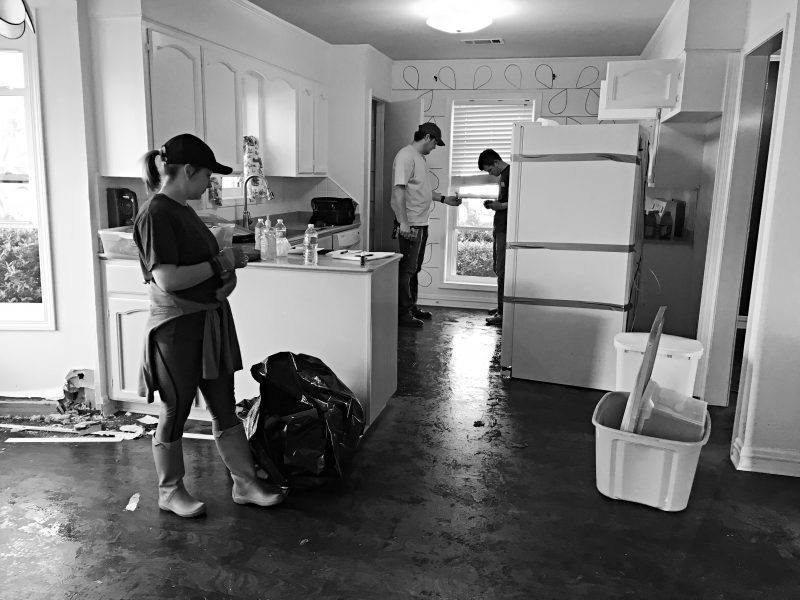 As Matthew and I experienced this flood together, we lost a lot. Lots of physical items, the safety and comfort of our home, sometimes our sanity and the overall quality of life and our marriage. Since the beginning of the process, I’ve compared this experience to that of losing a loved one. (Please note: if you just lost a loved one, I’m not at all saying that losing my favorite Antonio Melani pumps – along with thousands of other things – is the same as losing a person.) Instead, I’m saying is similar. If you don’t quite understand yet, let me explain further.
As Matthew and I experienced this flood together, we lost a lot. Lots of physical items, the safety and comfort of our home, sometimes our sanity and the overall quality of life and our marriage. Since the beginning of the process, I’ve compared this experience to that of losing a loved one. (Please note: if you just lost a loved one, I’m not at all saying that losing my favorite Antonio Melani pumps – along with thousands of other things – is the same as losing a person.) Instead, I’m saying is similar. If you don’t quite understand yet, let me explain further.
We went through the same stages of grief – denial, anger, bargaining, depression, and acceptance. There were some parts of the process in which we literally had to mourn. For months, we felt a sense of emptiness and incompleteness. Our worlds were shaken and turned upside down unexpectedly, and that simple fact left us in a state of chaos and grief for a long time.
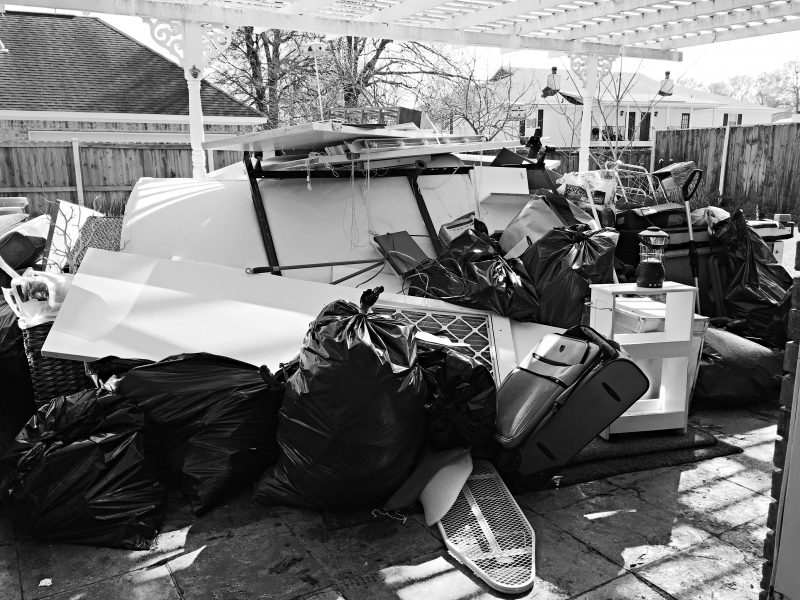 Over a year ago I came across this post about how to write a sympathy card and parts of that article have stuck with me since. Just recently I came across it again and was reminded of its good tips and point of view. I could also relate all of those back to this flood experience and thought this would be a good opportunity to share that post about sympathy and offer some suggestions on how to help a friend in need when you really don’t know what to do (as well as, a few suggestions on things to steer away from).
Over a year ago I came across this post about how to write a sympathy card and parts of that article have stuck with me since. Just recently I came across it again and was reminded of its good tips and point of view. I could also relate all of those back to this flood experience and thought this would be a good opportunity to share that post about sympathy and offer some suggestions on how to help a friend in need when you really don’t know what to do (as well as, a few suggestions on things to steer away from).
Let’s start with what TO do:
- Do something. This might seem obvious and yet it isn’t. Often times, we don’t know what to do to help in a time of loss or tragedy. It doesn’t mean that we don’t care – we just don’t know what the person needs. However, what will stand out to your friend is that you did something. We received many of the “if I can do anything, please let me know” messages, and we did appreciate the thoughts. The problem is, in a time of chaos and uncertainty, you really don’t know what you need. If you want to be there for your friend, just show up and do something. For us, we had people just show up to help us pack up what we could save and throw out the majority. They just showed up and it was the most comforting thing ever. We didn’t have to think, plan, or ask. They were just there. My suggestion to anyone wanting to comfort a loved one is to just so something. It doesn’t have to be anything huge. Show up with an icee, give them a hug, or just show your face so they can identify you as someone who cares. Bring take out, offer a night away from the craziness a few weeks/months later, bake cookies, run an errand for them…even the smallest of deeds will speak volumes to your friends. I promise. One of the main things that I’ll take away from this gruesome experience is that though we mean well saying “let me know what I can do to help,” they don’t know what they need. Just do something.
- Do realize that the pain and chaos doesn’t end that day or that week. Whether it be death or tragedy, it will affect your friends for months or years. The pain and heartache doesn’t go away after everyone else has returned to their normal lives. From experience, I know that it will mean the world to your friend if you check on them weeks or months later. After the initial shock dies down, most people return to back normal life and the effected is left still trying to figure things out alone. I remember the day the madness died down here. We’d been surrounded by friends and family helping. One day we woke up and the city had gone back to work. Friends weren’t here, volunteer crews had pulled out, churches were no longer delivering food, and it was the loneliest feeling you can imagine. Of course, we never expected to have support forever. The point I’m making here is that if you don’t know how else to help someone in need, watch for the new to wear off for everyone else. Watch for family to return home and people to stop talking about what happened. There’s a good chance that your friend is just now facing the reality of what happened and they could probably use a loving face to remind them that they’re not alone. Again, no one expects you to be a knight in shining armor and make the pain go away. Most of the time, just showing up and listening if they want to talk or unload is usually enough.
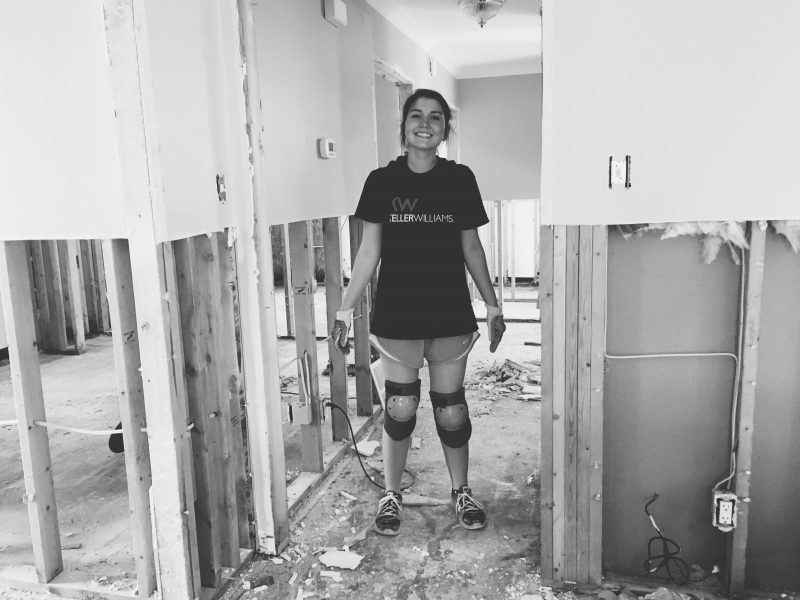 Now let’s talk about a few things NOT to do that might seem harmless at first glance:
Now let’s talk about a few things NOT to do that might seem harmless at first glance:
- Do NOT try to trump their story. So often during the process we got responses like “my aunt’s second cousin twice removed had 6 feet of water in her house.” Or even worse, “I know what you mean, my hydrangeas got so much water they’ll probably never bloom again.” Most of the time, people are just trying to make a connection and find common ground. However, telling someone that you know a story that’s worse than theirs can be a little insulting. And in the case of that second example, it might make them want to punch you in the face. In this situation, it’s definitely ok to share a similar story or show that you understand…just don’t belittle what’s happening to the person in front of you. The same thing often happens with death. Do your best to relate to the person without stealing the show. I often encounter this when a friend losses a loved one. I’ve had my fair share of experience with death so I definitely understand all of the emotions they’re feeling. However, this isn’t a time for me to tell my story of loss…it’s a time for them to tell theirs. My suggestion is to simply say, “I understand…I lost my dad to cancer too. It really sucks. Can I bring you a pizza tonight?” Leave it at that. Or, “Yes, I saw the crazy flooding and helped some friends move out. I have some extra towels you can borrow. Do you need those right now?” So many times during this flood, people would launch into stories they’d simply heard about people they hardly knew and while I always knew they were just trying to connect, it felt like they were competing with my story. And whether someone got two inches of water or twelve in their homes, I can promise it still rocked their world. It’s not a competition. We’re not trying to win. We all just want to survive.
- Do NOT say everything happens for a reason. Whether you believe this as truth or not, no one wants to hear that they just lost everything “for a reason.” When you’re in the throes of despair, the “reason” doesn’t matter. Whether you learn a lesson, become a better person, or end up better off in the end, the reason simply doesn’t matter when you’re hurting. Whether it’s a breakup, a death, or they’ve just fallen on hard times, don’t tell them it’s for a reason. Instead, tell them that they’ll make it through because they’re strong. Tell them that you hate they’re having to go through this. Tell them specifically how you can help (see #1). And then just listen.
- Do NOT ask “were they sick” or “did you have insurance.” It’s natural to sometimes let curiosity get the best of us. We want to know things and to understand. Even as outsider, we sometimes need to feel some closure and feel better because there was some preparation involved. However, regardless of whether their loved one was sick, or in our case if we had food insurance, the situation still sucks. Dismissing their struggle because they had insurance or knew it was coming, is very insensitive. In our case, most of the conversations happened like this: “aw, you flooded? That sucks. Did you have food insurance? Yes? Ok, bye.” I cannot even tell you how many times my feelings were hurt when people minimized what we were going through, simply because we had some insurance. Yes, that’s a relieving fact and something I’ll forever be grateful for. We still had to go through hell (and high water, ha) and I often felt disregarded simply because our story wasn’t as tragic as some others. Again, regardless of the topic, there’s someone’s story that’s always worse.
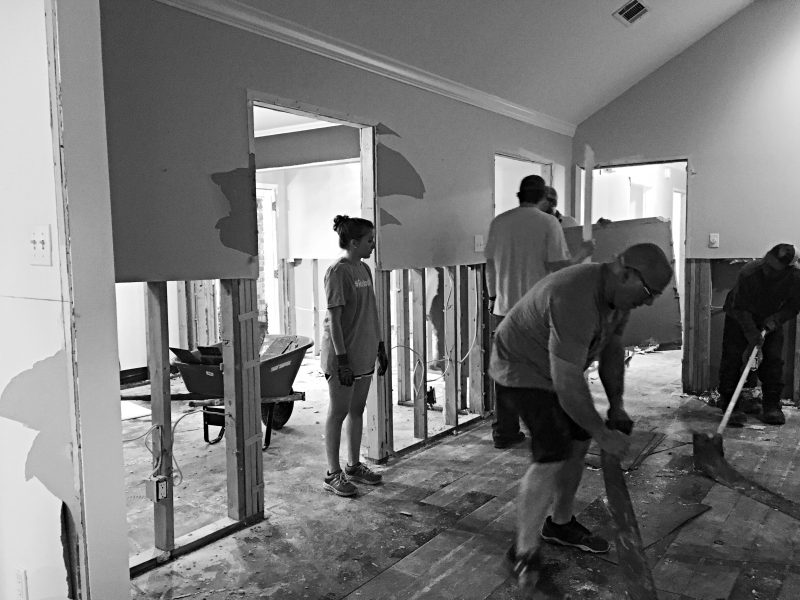 These few dos and don’ts are just suggestions based on my own experience and feelings. The second half of this post was drafed shortly after making sense of my own reality. We identified who showed up and who didn’t. We were met with a lot of unintended insults and could clearly see situations in which we, too, had committed these unintentional faux pas or should have done more to help someone. Gathering this list of “tips” helped me to process my own feelings on the topic and realize how I’d like to approach these situations going forward. Going forward, I won’t ask someone hurting to think of what I can do to help. Instead, I’ll offer specific things that I can do. And I’ll just show up. If anything, this experience has taught me how to be a better friend or a better stranger to those in need.
These few dos and don’ts are just suggestions based on my own experience and feelings. The second half of this post was drafed shortly after making sense of my own reality. We identified who showed up and who didn’t. We were met with a lot of unintended insults and could clearly see situations in which we, too, had committed these unintentional faux pas or should have done more to help someone. Gathering this list of “tips” helped me to process my own feelings on the topic and realize how I’d like to approach these situations going forward. Going forward, I won’t ask someone hurting to think of what I can do to help. Instead, I’ll offer specific things that I can do. And I’ll just show up. If anything, this experience has taught me how to be a better friend or a better stranger to those in need.
If you have learned other things from similar experiences, please leave a comment! I think we’d all like to be better friends and to know what to do when tragedy strikes with or without warning. Please share your thoughts! And please reach out and encourage those who are still struggling!

